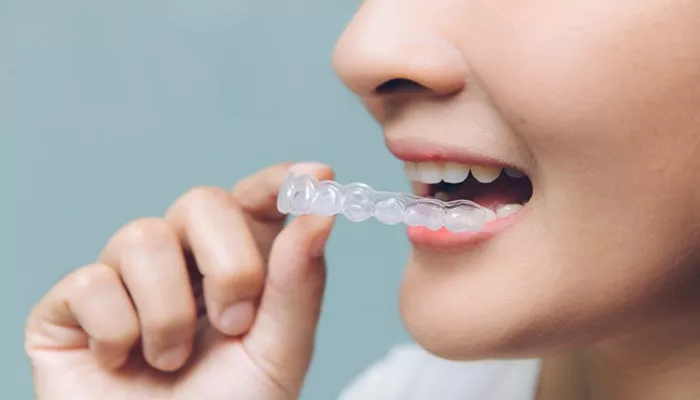Invisalign is a modern orthodontic solution that uses clear plastic aligners to straighten teeth. These aligners are custom-made to fit snugly over the teeth, gradually shifting them into the correct position.
Why Mouth Sores Occur During Invisalign Treatment
Mouth sores may develop from the friction between the aligners and the inner cheeks, tongue, or lips. In some cases, pressure from the aligners on specific teeth or gums can also cause irritation.
Identifying Invisalign-Related Mouth Sores
Types of Sores
Invisalign may cause different types of mouth sores such as:
- Canker sores
- Gum irritation
- Lip or cheek abrasions
- Tongue discomfort
Signs and Symptoms
Common signs include:
- Red or swollen gum tissue
- Burning or stinging sensations
- Ulcers on soft tissues
- Pain when speaking or eating
Immediate Relief for Invisalign Mouth Sores
Use of Orthodontic Wax
Orthodontic wax can be applied to rough edges of the aligners to prevent further friction. Break off a small piece and roll it into a ball, then press it onto the sore area of the aligner.
Salt Water Rinses
Rinsing the mouth with warm salt water helps soothe sore tissues and reduce inflammation. Mix one teaspoon of salt into a cup of warm water and rinse several times a day.
Topical Oral Gels
Over-the-counter oral gels containing benzocaine or similar numbing agents can provide temporary relief from pain. Apply a small amount directly to the sore using a clean finger or cotton swab.
Cold Compresses and Ice Chips
Applying cold compresses or sucking on ice chips can reduce swelling and numb the affected area. This is a safe and natural method for minor discomfort.
Preventing Invisalign Mouth Sores
Smooth the Aligners
Use a nail buffer or emery board to gently file down sharp or rough edges on the aligners. Be cautious not to damage the structural integrity of the aligner.
Practice Proper Oral Hygiene
Brushing and flossing regularly can reduce bacteria and plaque that might worsen mouth sores. This also lowers the risk of developing gum inflammation and gum disease.
Stay Hydrated
Dry mouth can exacerbate mouth sores. Drink plenty of water throughout the day to keep the mouth moist and healthy.
Adjust Wearing Time Gradually
If switching to new aligners causes discomfort, try wearing them for shorter periods during the first day and gradually increase wear time as your mouth adjusts.
Managing Gum Inflammation During Invisalign Treatment
Causes of Gum Inflammation
Gum inflammation may result from poor oral hygiene, bacterial buildup, or improper aligner cleaning. It may lead to bleeding, swelling, or pain in the gum tissue.
Cleaning Invisalign Aligners Properly
Always rinse aligners under lukewarm water. Use a soft toothbrush and clear, unscented antibacterial soap or aligner cleaning crystals. Avoid using toothpaste, which can scratch the aligner surface.
Regular Dental Checkups
Routine dental visits help detect early signs of gum disease and ensure the gums remain healthy throughout the Invisalign process. Dentists can professionally clean teeth and offer advice on oral care.
Natural Remedies to Support Healing
Aloe Vera Gel
Aloe vera has natural healing and anti-inflammatory properties. Apply a small amount of pure aloe gel to the sore area inside the mouth.
Honey Application
Honey has antimicrobial effects and can reduce pain and inflammation. Dab a small amount of raw honey on the mouth sore 2–3 times a day.
Coconut Oil Pulling
Swishing a tablespoon of coconut oil for 10-15 minutes can reduce bacteria and soothe irritation. This ancient practice supports overall oral health and gum care.
When to Seek Professional Help
Persistent or Worsening Symptoms
If mouth sores do not improve after a week or become more painful, consult your dentist or orthodontist. Delayed treatment may result in complications like infection or severe gum disease.
Gum Bleeding or Pus Formation
Bleeding gums, especially if accompanied by pus, are signs of advanced gum disease or infection. These require immediate professional evaluation and intervention.
Long-Term Care Tips for Invisalign Wearers
Maintain Consistent Oral Care Habits
Brush twice a day with fluoride toothpaste, floss once daily, and rinse with an antibacterial mouthwash. Good hygiene keeps gums healthy and prevents oral discomfort.
Use Fluoride Mouth Rinse
Fluoride strengthens enamel and reduces the risk of cavities and dental disease. Rinse once daily after brushing, especially before bed.
Avoid Irritating Foods
Spicy, acidic, and crunchy foods can irritate sores. Choose soft, bland foods until the sore heals. Avoid hot beverages, which can aggravate pain.
Monitor Aligner Fit
Ensure your aligners fit properly. If they seem too tight or are causing sharp pressure, notify your orthodontist for adjustment. Poor fit can lead to recurring mouth injuries.
The Link Between Invisalign and Gum Disease
Why Invisalign May Trigger Gum Problems
Invisalign does not cause gum disease, but poor hygiene during treatment can. Plaque trapped beneath aligners fosters bacterial growth, leading to gingivitis or periodontitis if left untreated.
How to Prevent Gum Disease With Invisalign
Clean your aligners and teeth thoroughly. Remove aligners while eating or drinking anything other than water. Store them in a ventilated case to reduce bacterial growth.
Combining Professional and At-Home Care
Customized Treatment Plans
Work with your dental professional to create a care plan tailored to your needs. This ensures effective symptom control and long-term oral health.
Orthodontist’s Role in Preventing Sores
Orthodontists can trim or polish aligners to minimize irritation. They may also prescribe specialized mouth rinses or protective gels to ease discomfort.
Monitoring for Recurrence
After healing, continue observing your mouth for signs of new sores. Keeping a symptom diary can help identify triggers or patterns linked to aligner changes.
Conclusion
While Invisalign offers a discreet and effective way to straighten teeth, it may cause temporary mouth sores. Fortunately, most discomfort can be relieved using simple home remedies, proper aligner care, and professional guidance. Prioritizing oral hygiene is key to preventing gum inflammation, gum disease, and other dental-related conditions. With the right approach, Invisalign users can enjoy a healthy, pain-free orthodontic journey.

